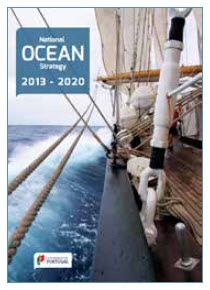PORTUGAL
|
OCEAN ENERGY POLICY NATIONAL STRATEGY The three key pillars of the maritime economy are: Knowledge, Spatial Planning, and Promotion of National Interests. The plan defines strategic actions, such as the support for new forms of technology applied to maritime activities, by creating conditions for the installation, testing and development of emerging forms of technology. Available at: |
 |
LEGISLATION AND REGULATORY ISSUES
In April 2014 the Portuguese Law 17/2014 on ‘marine spatial planning and management’ was created. This is seen as a Basic Law of the Planning and Management of the National Maritime Space complementing the existing maritime spatial planning called “POEM”, published in late 2012. This legislation will clarify the licensing process in the sea for marine renewable energies projects.
The European Commission through DGMare has been funding the development of projects with the objective of promoting maritime spatial planning between different countries. Portugal was involved in coordinating the project “TPEA - Transboundary Planning in the European Atlantic” and developed a proposal for a Geoportal, for data sharing between Member States (Portugal-Spain and UK-Ireland) and further explored methodologies for cross border cooperation and coordination with the adjacent coastal zone. This project was completed in May 2014 and a guide of good practices was published.
A revision of the existing Environmental Impact Assessment (EIA) legislation was released in October 2013, creating a web-based “one-stop-shop” facility for the environmental licensing of projects, enabling the digital delivery of documents during the EIA process. According to this new legislation the timeline of the licensing procedures has been also clarified.
MARKET INCENTIVES
The existing support schemes (Feed-in Tariffs) for renewables have been under review. Portugal had in place a Feed-in Tariff for wave energy applicable for a certain time frame or until an upper limit of electricity produced is reached. It was one of the highest Feedin Tariffs for wave energy demonstration projects. However this tariff has been suspended by the Portuguese Government pending the creation of new support mechanisms for wave energy.
PUBLIC FUNDING PROGRAMMES
In Portugal the Foundation for Science and Technology (FCT) is the main funding agency for research covering all fields of science, including ocean energy. FCT is part of OCEANERA-NET, a network of 16 European national and regional funders and managers of research and innovation programmes, from 9 countries, in the field of ocean energy, funded by the European Commission. The first join call for proposals was launched in October 2014. Business-oriented research in Portugal is funded by “ANI – Agência Nacional de Inovação, S.A.” (national innovation agency) former Innovation Agency (Adi), funded by the Ministry of Education and Science and the Ministry of Economy.
SEA TEST SITES
In Portugal, a specific site for wave energy development – offshore S. Pedro de Moel, between Figueira da Foz and Nazaré - with an area of 320 km2, was designated by the Portuguese State, in 2008. In 2010, ENONDAS (a subsidiary of the Portuguese Grid Transmission System Operator) received from the Portuguese State a public concession for this site for 45 years. During 2014, three documents were published:
- Environmental Characterization
- Access Regulation
- Geophysical Characterization
These documents have been provisionally approved by the General Directorate for Energy and Geology
(DGEG), after being in public discussion for a month until 12 October 2014 (available at: http://www.oceanplug.pt/en-GB/biblioteca/)



